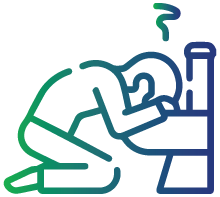
Dengue Profile, ELISA Test
Dengue Profile, ELISA Test
The Dengue Profile, ELISA, is a group of tests designed to diagnose dengue fever and monitor its progression. This panel includes Dengue Antibody IgG and IgM tests, Dengue NS1 Antigen detection, and a platelet count. It is particularly useful for early detection and assessing the immune response to the dengue virus, a mosquito-borne infection that can lead to severe complications if left untreated.
What is the Dengue Profile, ELISA Used For?
The Dengue Profile is utilized for:
- Early Detection: Identifying dengue virus infection in its acute phase.
- Determining Immune Response: Evaluating IgM and IgG antibody levels to distinguish between recent and past infections.
- Monitoring Disease Progression: Platelet count helps track complications like dengue hemorrhagic fever (DHF) or dengue shock syndrome (DSS).
Guiding Clinical Decisions: Differentiating dengue fever from other febrile illnesses.
Components of the Dengue Profile, ELISA
Dengue Antibody IgG, ELISA
-
Detects IgG antibodies, which develop later in the infection and remain in the blood for an extended period. A positive result indicates past exposure to the dengue virus or ongoing secondary infection.
Dengue Antibody IgM, ELISA
-
Identifies IgM antibodies, which are the first to appear during a dengue infection, usually detectable 4–7 days after symptom onset. A positive result suggests a recent or acute infection.
Dengue NS1 Antigen, ELISA
-
Detects the nonstructural protein NS1, a marker of the dengue virus present during the early stages of infection (days 1–7). This test is highly specific and helps confirm acute dengue fever.
Platelet Count
-
- Evaluates the number of platelets in the blood, which are often significantly reduced in dengue fever. A low platelet count (thrombocytopenia) increases the risk of bleeding and is a critical marker for severe dengue.
Symptoms Indicating the Need for the Test
The Dengue Profile is recommended if you experience

Sudden high fever (above 102°F or 39°C)

Severe headache, especially behind the

Muscle, joint, or bone pain (often referred to as "breakbone fever")

Skin rash or petechiae (small red spots caused by bleeding)

Nausea, vomiting, or abdominal pain

Unexplained fatigue or weakness

Bleeding gums

Difficulty breathing
Preparation for the Test
No specific preparation is needed for the Dengue Profile, ELISA. However:
- Inform Your Doctor: Share details about any medications or supplements you are taking.
- Hydration: Stay well-hydrated before the blood draw.
The test involves collecting a blood sample from a vein, which is then analyzed in the laboratory.
Interpretation of Results
The results provide a comprehensive overview of the infection:
- Dengue Antibody IgM:
- Positive: Indicates a recent or acute dengue infection.
- Negative: Rules out recent infection but does not exclude early-stage infection (before antibodies develop).
- Dengue Antibody IgG:
- Positive: Suggests past infection or secondary infection.
- Negative: Indicates no prior exposure to dengue virus.
- Dengue NS1 Antigen:
- Positive: Confirms active dengue infection in the early stages (days 1–7).
- Negative: Does not exclude dengue, especially if tested after the first week of illness.
- Platelet Count:
- Low: Indicates thrombocytopenia, a hallmark of severe dengue. Monitoring platelet levels is essential for detecting complications like DHF or DSS.
Results should be interpreted in conjunction with clinical symptoms and other diagnostic findings for accurate diagnosis and management.
FAQs
What is dengue fever, and why is early detection important?
Dengue fever is a viral illness transmitted by Aedes mosquitoes. Early detection enables timely treatment, reducing the risk of severe complications like DHF or DSS.
How is dengue transmitted?
Dengue spreads through the bite of infected Aedes aegypti or Aedes albopictus mosquitoes, which are most active during the day.
Can dengue occur more than once?
Yes, there are four distinct dengue virus serotypes (DENV-1 to DENV-4). Infection with one serotype does not provide immunity against the others, making secondary infections possible.
What treatments are available for dengue fever?
There is no specific antiviral treatment. Management focuses on supportive care, including hydration, fever control, and close monitoring for complications.
Why is platelet monitoring critical in dengue?
Platelets play a key role in blood clotting. A significant drop in platelet count can lead to bleeding, making regular monitoring essential in dengue patients.

